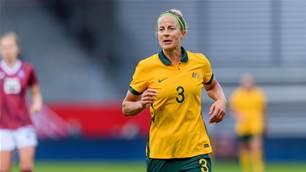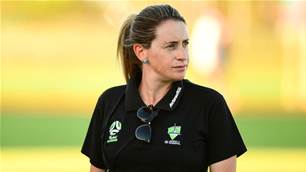DAVID Beckham will turn up at the Bird's Nest stadium in Beijing at the weekend where the word is he will boot a football into the crowd from the roof of a London bus as part of the Olympic closing ceremony.
No doubt it will go off brilliantly. Beckham is revered in Asia, as much for his looks and his lifestyle as for his football.
If he says everything is going to be great in London in four years' time then the Chinese, a fifth of the world's population, are likely to believe him.
It does not mean the rest of us need to be taken in when he spins us a line about the state of the England football team.
Within minutes of England's latest unconvincing performance, a 2-2 draw at Wembley against the Czech Republic, Beckham was in positive mood.
"Everything is there," he said. "Everything is right at the moment. We feel we have got the right players in the team. We feel we have got the right manager, the right staff behind everyone."
If ever four 'rights' made a wrong then it was in that sentence.
With the World Cup qualifiers three weeks away all is far from right in the world of England football.
For a start it is not usual to be booed off the field by your own supporters when "everything is right."
Fabio Capello has changed the coaches, improved the discipline, prolonged the international career of Beckham and restored John Terry to the captaincy.
But he has failed to make a jot of difference to England's most basic problem - how to get the players to perform for their country as they do so creditably in the Champions League for their clubs.
Sven Goran Eriksson failed in that mission. So did Steve McClaren.
Five matches under Capello is not long enough to witness a revolution. England cannot be changed from a long-ball team who rely on power and pace into an intelligent, creative, patient, passing force in a few short months.
But you would expect to see progress.
You would expect to see a modicum of cohesion against a Czech side who failed to impress in Euro 2008 and whose main threat was Milan Baros, a bit-part player with Portsmouth last season.
That there was precious little was worrying.
But not nearly as worrying as the perceived attitude among the England players that everything would be all right on the nights of the World Cup qualifiers.
Listen to Terry. "I don't think we should be worried," he said. "We have to stand up and be counted, raise our game, match teams with the commitment they show and hopefully our quality can overcome them."
We have heard all that before. It is exactly the line pedalled before McClaren cowered under his umbrella at Wembley last autumn and prevaricated as an ordinary Croatia taught England a lesson in counter-attacking football.
England lack a midfield playmaker of genuine invention but they do have quality footballers, of that there is no question.
What they do not have enough of are the qualities which have been so apparent in the rush of British gold medals here in Beijing.
Where is the meticulous long-term planning which has seen cycling transform itself, with the leadership of performance director Dave Brailsford, into Britain's most successful Olympic sport?
Four chief executives of the Football Association in the past decade, with Brian Barwick's imminent departure, is hardly a recipe for consistency and direction.
Where is the tactical clarity when a defence is so prone to the counter-attack?
But mostly, where is the passion and intensity? Where is the ruthless finishing of triple gold medal cyclist Chris Hoy, the utter dedication of double gold swimmer Rebecca Adlington and the sheer will to win of Christine Ohuruogu.
You simply do not see those qualities often enough in footballers wearing an England shirt.
Spectators can forgive a lot. They can accept losing to more talented teams. But they cannot forgive highly-paid footballers not producing the fire and commitment they do week in and week out in the Premier League.
Beckham says: "We believe we are going to qualify for the World Cup, but we know there is a lot of hard work to be done."
At least he got the last bit right.
************
Brian Barwick's appointment of Steve McClaren as England manager was not his finest moment, especially the bit where he sat squirming in Soho Square insisting that McClaren was the FA's first choice for the job all along, when Luiz Felipe Scolari was spilling the beans on how it had been offered to him.
Yet Barwick delivered Wembley, eventually. He filled FA coffers with lucrative television fees. He secured agreement on a much-needed national academy and can anyone argue that the 'Respect' campaign he instigated was not overdue?
True, the jury is still out on England manager Fabio Capello, but I'd say the FA's departing chief executive had done a half-decent job.
If he says everything is going to be great in London in four years' time then the Chinese, a fifth of the world's population, are likely to believe him.
It does not mean the rest of us need to be taken in when he spins us a line about the state of the England football team.
Within minutes of England's latest unconvincing performance, a 2-2 draw at Wembley against the Czech Republic, Beckham was in positive mood.
"Everything is there," he said. "Everything is right at the moment. We feel we have got the right players in the team. We feel we have got the right manager, the right staff behind everyone."
If ever four 'rights' made a wrong then it was in that sentence.
With the World Cup qualifiers three weeks away all is far from right in the world of England football.
For a start it is not usual to be booed off the field by your own supporters when "everything is right."
Fabio Capello has changed the coaches, improved the discipline, prolonged the international career of Beckham and restored John Terry to the captaincy.
But he has failed to make a jot of difference to England's most basic problem - how to get the players to perform for their country as they do so creditably in the Champions League for their clubs.
Sven Goran Eriksson failed in that mission. So did Steve McClaren.
Five matches under Capello is not long enough to witness a revolution. England cannot be changed from a long-ball team who rely on power and pace into an intelligent, creative, patient, passing force in a few short months.
But you would expect to see progress.
You would expect to see a modicum of cohesion against a Czech side who failed to impress in Euro 2008 and whose main threat was Milan Baros, a bit-part player with Portsmouth last season.
That there was precious little was worrying.
But not nearly as worrying as the perceived attitude among the England players that everything would be all right on the nights of the World Cup qualifiers.
Listen to Terry. "I don't think we should be worried," he said. "We have to stand up and be counted, raise our game, match teams with the commitment they show and hopefully our quality can overcome them."
We have heard all that before. It is exactly the line pedalled before McClaren cowered under his umbrella at Wembley last autumn and prevaricated as an ordinary Croatia taught England a lesson in counter-attacking football.
England lack a midfield playmaker of genuine invention but they do have quality footballers, of that there is no question.
What they do not have enough of are the qualities which have been so apparent in the rush of British gold medals here in Beijing.
Where is the meticulous long-term planning which has seen cycling transform itself, with the leadership of performance director Dave Brailsford, into Britain's most successful Olympic sport?
Four chief executives of the Football Association in the past decade, with Brian Barwick's imminent departure, is hardly a recipe for consistency and direction.
Where is the tactical clarity when a defence is so prone to the counter-attack?
But mostly, where is the passion and intensity? Where is the ruthless finishing of triple gold medal cyclist Chris Hoy, the utter dedication of double gold swimmer Rebecca Adlington and the sheer will to win of Christine Ohuruogu.
You simply do not see those qualities often enough in footballers wearing an England shirt.
Spectators can forgive a lot. They can accept losing to more talented teams. But they cannot forgive highly-paid footballers not producing the fire and commitment they do week in and week out in the Premier League.
Beckham says: "We believe we are going to qualify for the World Cup, but we know there is a lot of hard work to be done."
At least he got the last bit right.
************
Brian Barwick's appointment of Steve McClaren as England manager was not his finest moment, especially the bit where he sat squirming in Soho Square insisting that McClaren was the FA's first choice for the job all along, when Luiz Felipe Scolari was spilling the beans on how it had been offered to him.
Yet Barwick delivered Wembley, eventually. He filled FA coffers with lucrative television fees. He secured agreement on a much-needed national academy and can anyone argue that the 'Respect' campaign he instigated was not overdue?
True, the jury is still out on England manager Fabio Capello, but I'd say the FA's departing chief executive had done a half-decent job.
Copyright (c) Press Association
Related Articles

Matildas' new Serie A star announces international retirement

Why A-League 20/21 is crucial for Olyroos’ medal hopes













